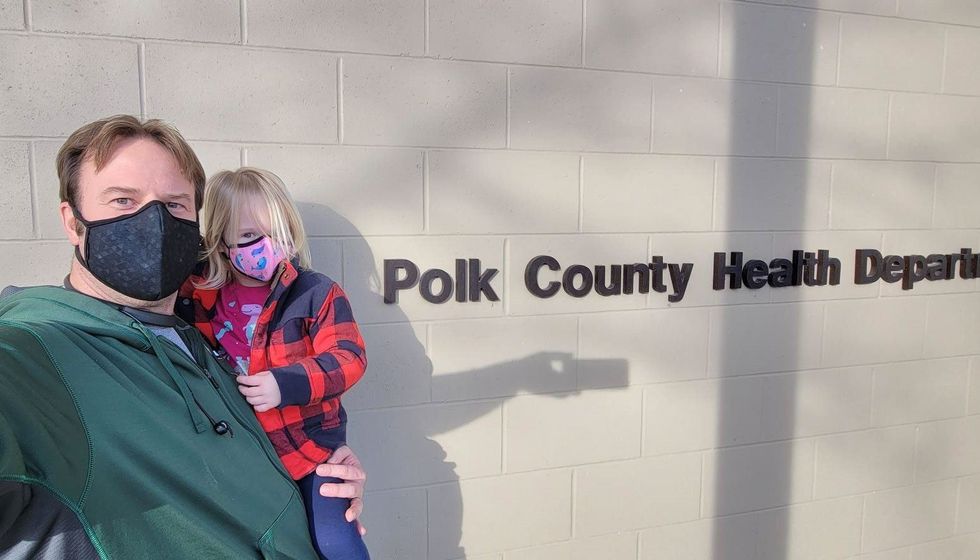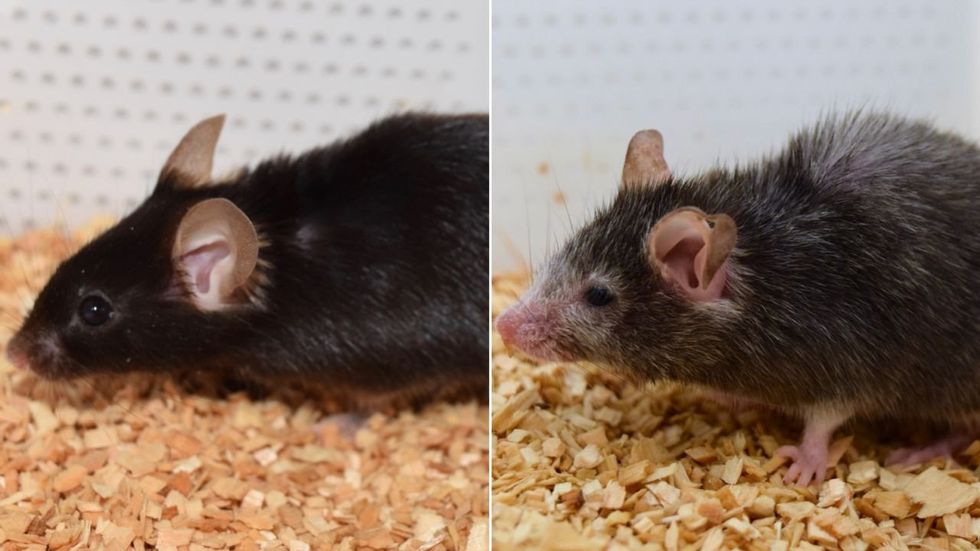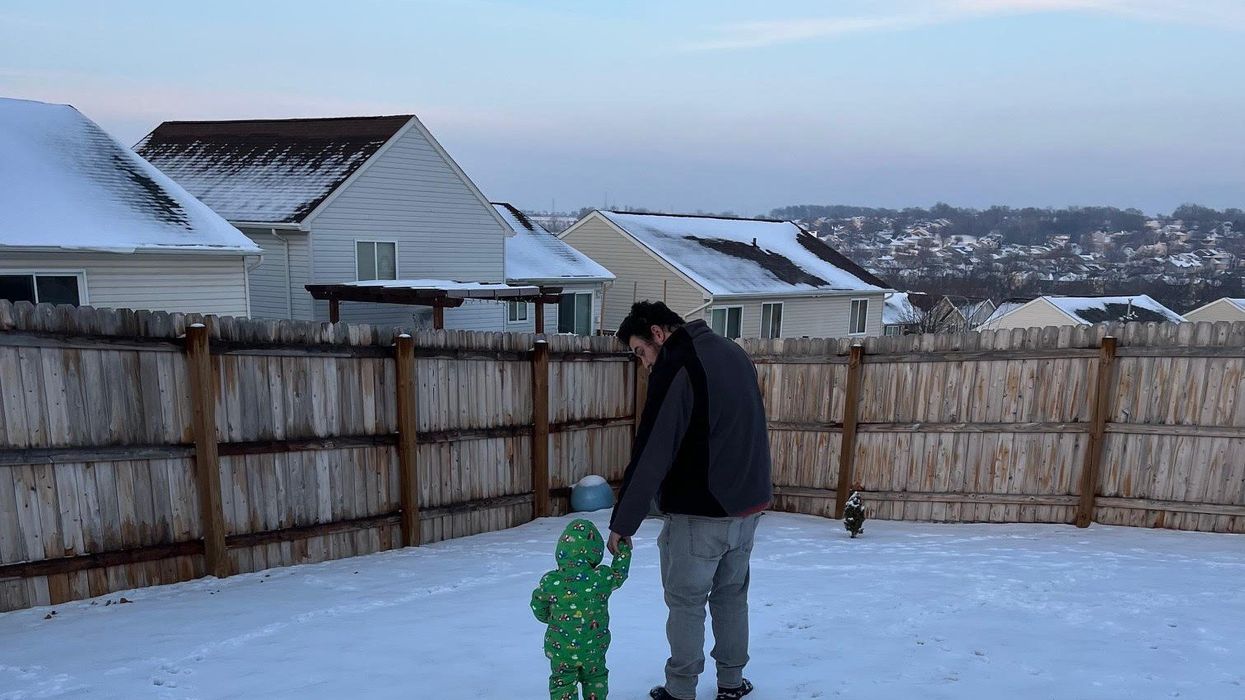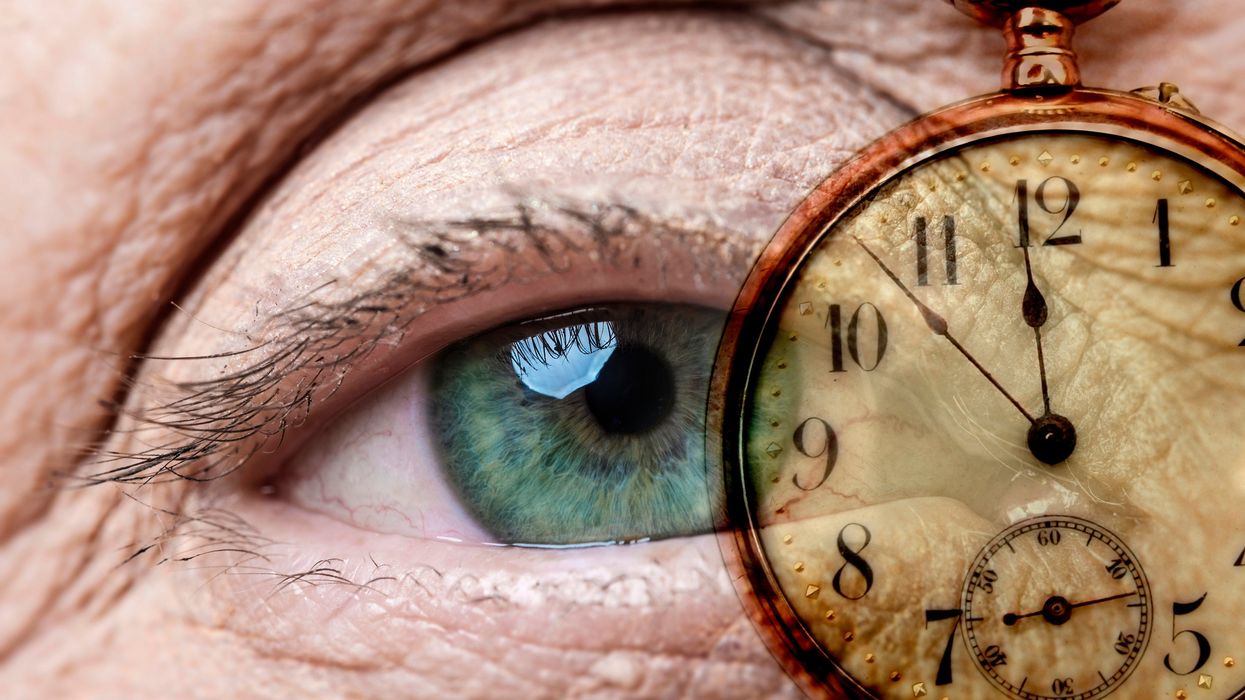Short Story Contest Winner: "The Gerry Program"

A father and son gaze at the ducks in a lake.
It's an odd sensation knowing you're going to die, but it was a feeling Gerry Ferguson had become relatively acquainted with over the past two years. What most perplexed the terminally ill, he observed, was not the concept of death so much as the continuation of all other life.
Gerry's secret project had been in the works for two years now, ever since they found the growth.
Who will mourn me when I'm gone? What trait or idiosyncrasy will people most recall? Will I still be talked of, 100 years from now?
But Gerry didn't worry about these questions. He was comfortable that his legacy would live on, in one form or another. From his cozy flat in the west end of Glasgow, Gerry had managed to put his affairs in order and still find time for small joys.
Feeding the geese in summer at the park just down from his house, reading classics from the teeming bookcase in the living room, talking with his son Michael on Skype. It was Michael who had first suggested reading some of the new works of non-fiction that now littered the large oak desk in Gerry's study.
He was just finishing 'The Master Algorithm' when his shabby grandfather clock chimed six o'clock. Time to call Michael. Crammed into his tiny study, Gerry pulled his computer's webcam close and waved at Michael's smiling face.
"Hi Dad! How're you today?"
"I'm alright, son. How're things in sunny Australia?"
"Hot as always. How's things in Scotland?"
"I'd 'ave more chance gettin' a tan from this computer screen than I do goin' out there."
Michael chuckled. He's got that hearty Ferguson laugh, Gerry thought.
"How's the project coming along?" Michael asked. "Am I going to see it one of these days?"
"Of course," grinned Gerry, "I designed it for you."
Gerry's secret project had been in the works for two years now, ever since they found the growth. He had decided it was better not to tell Michael. He would only worry.
The two men chatted for hours. They discussed Michael's love life (or lack thereof), memories of days walking in the park, and their shared passion, the unending woes of Rangers Football Club. It wasn't until Michael said his goodbyes that Gerry noticed he'd been sitting in the dark for the best part of three hours, his mesh curtains casting a dim orange glow across the room from the street light outside. Time to get back to work.
*
Every night, Gerry sat at his computer, crawling forums, nourishing his project, feeding his knowledge and debating with other programmers. Even at age 82, Gerry knew more than most about algorithms. Never wanting to feel old, and with all the kids so adept at this digital stuff, Gerry figured he should give the Internet a try too. Besides, it kept his brain active and restored some of the sociability he'd lost in the previous decades as old friends passed away and the physical scope of his world contracted.
This night, like every night, Gerry worked away into the wee hours. His back would ache come morning, but this was the only time he truly felt alive these days. From his snug red brick home in Scotland, Gerry could share thoughts and information with strangers from all over the world. It truly was a miracle of modern science!
*
The next day, Gerry woke to the warm amber sun seeping in between a crack in the curtains. Like every morning, his thoughts took a little time to come into focus. Instinctively his hand went to the other side of the bed. Nobody there. Of course; she was gone. Rita, the sweetest woman he'd ever known. Four years this spring, God rest her soul.
Puttering around the cramped kitchen, Gerry heard a knock at the door. Who could that be? He could see two women standing in the hallway, their bodies contorted in the fisheye glass of the peephole. One looked familiar, but Gerry couldn't be sure. He fiddled with the locks and pulled the door open.
"Hi Gerry. How are you today?"
"Fine, thanks," he muttered, still searching his mind for where he'd seen her face before.
Noting the confusion in his eyes, the woman proffered a hand. "Alice, Alice Corgan. I pop round every now and again to check on you."
It clicked. "Ah aye! Come in, come in. Lemme get ya a cuppa." Gerry turned and shuffled into the flat.
As Gerry set about his tiny kitchen, Alice called from the living room, "This is Mandy. She's a care worker too. She's going to pay you occasional visits if that's alright with you."
Gerry poked his head around the doorway. "I'll always welcome a beautiful young lady in ma home. Though, I've tae warn you I'm a married man, so no funny business." He winked and ducked back into the kitchen.
Alice turned to Mandy with a grin. "He's a good man, our Gerry. You'll get along just fine." She lowered her voice. "As I said, with the Alzheimer's, he has to be reminded to take his medication, but he's still mostly self-sufficient. We installed a medi-bot to remind him every day and dispense the pills. If he doesn't respond, we'll get a message to send someone over."
Mandy nodded and scribbled notes in a pad.
"When I'm gone, Michael will have somethin' to remember me by."
"Also, and this is something we've been working on for a few months now, Gerry is convinced he has something…" her voice trailed off. "He thinks he has cancer. Now, while the Alzheimer's may affect his day-to-day life, it's not at a stage where he needs to be taken into care. The last time we went for a checkup, the doctor couldn't find any sign of cancer. I think it stems from--"
Gerry shouted from the other room: "Does the young lady take sugar?"
"No, I'm fine thanks," Mandy called back.
"Of course you don't," smiled Gerry. "Young lady like yersel' is sweet enough."
*
The following week, Mandy arrived early at Gerry's. He looked unsure at first, but he invited her in.
Sitting on the sofa nurturing a cup of tea, Alice tried to keep things light. "So what do you do in your spare time, Gerry?"
"I've got nothing but spare time these days, even if it's running a little low."
"Do you have any hobbies?"
"Yes actually." Gerry smiled. "I'm makin' a computer program."
Alice was taken aback. She knew very little about computers herself. "What's the program for?" she asked.
"Well, despite ma appearance, I'm no spring chicken. I know I don't have much time left. Ma son, he lives down in Australia now, he worked on a computer program that uses AI - that's artificial intelligence - to imitate a person."
Alice still looked confused, so Gerry pressed on.
"Well, I know I've not long left, so I've been usin' this open source code to make ma own for when I'm gone. I've already written all the code. Now I just have to add the things that make it seem like me. I can upload audio, text, even videos of masel'. That way, when I'm gone, Michael will have somethin' to remember me by."
Mandy sat there, stunned. She had no idea anybody could do this, much less an octogenarian from his small, ramshackle flat in Glasgow.
"That's amazing Gerry. I'd love to see the real thing when you're done."
"O' course. I mean, it'll take time. There's so much to add, but I'll be happy to give a demonstration."
Mandy sat there and cradled her mug. Imagine, she thought, being able to preserve yourself, or at least some basic caricature of yourself, forever.
*
As the weeks went on, Gerry slowly added new shades to his coded double. Mandy would leaf through the dusty photo albums on Gerry's bookcase, pointing to photos and asking for the story behind each one. Gerry couldn't always remember but, when he could, the accompanying stories were often hilarious, incredible, and usually a little of both. As he vividly recounted tales of bombing missions over Burma, trips to the beach with a young Michael and, in one particularly interesting story, giving the finger to Margaret Thatcher, Mandy would diligently record them through a Dictaphone to be uploaded to the program.
Gerry loved the company, particularly when he could regale the young woman with tales of his son Michael. One day, as they sat on the sofa flicking through a box of trinkets from his days as a travelling salesman, Mandy asked why he didn't have a smartphone.
He shrugged. "If I'm out 'n about then I want to see the world, not some 2D version of it. Besides, there's nothin' on there for me."
Alice explained that you could get Skype on a smartphone: "You'd be able to talk with Michael and feed the geese at the park at the same time," she offered.
Gerry seemed interested but didn't mention it again.
"Only thing I'm worried about with ma computer," he remarked, "is if there's another power cut and I can't call Michael. There's been a few this year from the snow 'n I hate not bein' able to reach him."
"Well, if you ever want to use the Skype app on my phone to call him you're welcome," said Mandy. "After all, you just need to add him to my contacts."
Gerry was flattered. "That's a relief, knowing I won't miss out on calling Michael if the computer goes bust."
*
Then, in early spring, just as the first green buds burst forth from the bare branches, Gerry asked Mandy to come by. "Bring that Alice girl if ya can - I know she's excited to see this too."
The next day, Mandy and Alice dutifully filed into the cramped study and sat down on rickety wooden chairs brought from the living room for this special occasion.
An image of Gerry, somewhat younger than the man himself, flashed up on the screen.
With a dramatic throat clearing, Gerry opened the program on his computer. An image of Gerry, somewhat younger than the man himself, flashed up on the screen.
The room was silent.
"Hiya Michael!" AI Gerry blurted. The real Gerry looked flustered and clicked around the screen. "I forgot to put the facial recognition on. Michael's just the go-to name when it doesn't recognize a face." His voice lilted with anxious excitement. "This is Alice," Gerry said proudly to the camera, pointing at Alice, "and this is Mandy."
AI Gerry didn't take his eyes from real Gerry, but grinned. "Hello, Alice. Hiya Mandy." The voice was definitely his, even if the flow of speech was slightly disjointed.
"Hi," Alice and Mandy stuttered.
Gerry beamed at both of them. His eyes flitted between the girls and the screen, perhaps nervous that his digital counterpart wasn't as polished as they'd been expecting.
"You can ask him almost anything. He's not as advanced as the ones they're making in the big studios, but I think Michael will like him."
Alice and Mandy gathered closer to the monitor. A mute Gerry grinned back from the screen. Sitting in his wooden chair, the real Gerry turned to his AI twin and began chattering away: "So, what do you think o' the place? Not bad eh?"
"Oh aye, like what you've done wi' it," said AI Gerry.
"Gerry," Alice cut in. "What did you say about Michael there?"
"Ah, I made this for him. After all, it's the kind o' thing his studio was doin'. I had to clear some space to upload it 'n show you guys, so I had to remove Skype for now, but Michael won't mind. Anyway, Mandy's gonna let me Skype him from her phone."
Mandy pulled her phone out and smiled. "Aye, he'll be able to chat with two Gerry's."
Alice grabbed Mandy by the arm: "What did you tell him?" she whispered, her eyes wide.
"I told him he can use my phone if he wants to Skype Michael. Is that okay?"
Alice turned to Gerry, who was chattering away with his computerized clone. "Gerry, we'll just be one second, I need to discuss something with Mandy."
"Righto," he nodded.
Outside the room, Alice paced up and down the narrow hallway.
Mandy could see how flustered she was. "What's wrong? Don't you like the chatbot? I think it's kinda c-"
"Michael's dead," Alice spluttered.
"What do you mean? He talks to him all the time."
Alice sighed. "He doesn't talk to Michael. See, a few years back, Michael found out he had cancer. He worked for this company that did AI chatbot stuff. When he knew he was dying he--" she groped in the air for the words-- "he built this chatbot thing for Gerry, some kind of super-advanced AI. Gerry had just been diagnosed with Alzheimer's and I guess Michael was worried Gerry would forget him. He designed the chatbot to say he was in Australia to explain why he couldn't visit."
"That's awful," Mandy granted, "but I don't get what the problem is. I mean, surely he can show the AI Michael his own chatbot?"
"No, because you can't get the AI Michael on Skype. Michael just designed the program to look like Skype."
"But then--" Mandy went silent.
"Michael uploaded the entire AI to Gerry's computer before his death. Gerry didn't delete Skype. He deleted the AI Michael."
"So… that's it? He-he's gone?" Mandy's voice cracked. "He can't just be gone, surely he can't?"
The women stood staring at each other. They looked to the door of the study. They could still hear Gerry, gabbing away with his cybercopy.
"I can't go back in there," muttered Mandy. Her voice wavered as she tried to stem the misery rising in her throat.
Alice shook her head and paced the floor. She stopped and stared at Mandy with grim resignation. "We don't have a choice."
When they returned, Gerry was still happily chatting away.
"Hiya girls. Ya wanna ask my handsome twin any other questions? If not, we could get Michael on the phone?"
Neither woman spoke. Gerry clapped his hands and turned gaily to the monitor again: "I cannae wait for ya t'meet him, Gerry. He's gonna be impressed wi' you."
Alice clasped her hands to her mouth. Tears welled in the women's eyes as they watched the old man converse with his digital copy. The heat of the room seemed to swell, becoming insufferable. Mandy couldn't take it anymore. She jumped up, bolted to the door and collapsed against a wall in the hallway. Alice perched on the edge of her seat in a dumb daze, praying for the floor to open and swallow the contents of the room whole.
Oblivious, Gerry and his echo babbled away, the blue glow of the screen illuminating his euphoric face. "Just wait until y'meet him Gerry, just wait."
Bivalent Boosters for Young Children Are Elusive. The Search Is On for Ways to Improve Access.
Theo, an 18-month-old in rural Nebraska, walks with his father in their backyard. For many toddlers, the barriers to accessing COVID-19 vaccines are many, such as few locations giving vaccines to very young children.
It’s Theo’s* first time in the snow. Wide-eyed, he totters outside holding his father’s hand. Sarah Holmes feels great joy in watching her 18-month-old son experience the world, “His genuine wonder and excitement gives me so much hope.”
In the summer of 2021, two months after Theo was born, Holmes, a behavioral health provider in Nebraska lost her grandparents to COVID-19. Both were vaccinated and thought they could unmask without any risk. “My grandfather was a veteran, and really trusted the government and faith leaders saying that COVID-19 wasn’t a threat anymore,” she says.” The state of emergency in Louisiana had ended and that was the message from the people they respected. “That is what killed them.”
The current official public health messaging is that regardless of what variant is circulating, the best way to be protected is to get vaccinated. These warnings no longer mention masking, or any of the other Swiss-cheese layers of mitigation that were prevalent in the early days of this ongoing pandemic.
The problem with the prevailing, vaccine centered strategy is that if you are a parent with children under five, barriers to access are real. In many cases, meaningful tools and changes that would address these obstacles are lacking, such as offering vaccines at more locations, mandating masks at these sites, and providing paid leave time to get the shots.
Children are at risk
Data presented at the most recent FDA advisory panel on COVID-19 vaccines showed that in the last year infants under six months had the third highest rate of hospitalization. “From the beginning, the message has been that kids don’t get COVID, and then the message was, well kids get COVID, but it’s not serious,” says Elias Kass, a pediatrician in Seattle. “Then they waited so long on the initial vaccines that by the time kids could get vaccinated, the majority of them had been infected.”
A closer look at the data from the CDC also reveals that from January 2022 to January 2023 children aged 6 to 23 months were more likely to be hospitalized than all other vaccine eligible pediatric age groups.
“We sort of forced an entire generation of kids to be infected with a novel virus and just don't give a shit, like nobody cares about kids,” Kass says. In some cases, COVID has wreaked havoc with the immune systems of very young children at his practice, making them vulnerable to other illnesses, he said. “And now we have kids that have had COVID two or three times, and we don’t know what is going to happen to them.”
Jumping through hurdles
Children under five were the last group to have an emergency use authorization (EUA) granted for the COVID-19 vaccine, a year and a half after adult vaccine approval. In June 2022, 30,000 sites were initially available for children across the country. Six months later, when boosters became available, there were only 5,000.
Currently, only 3.8% of children under two have completed a primary series, according to the CDC. An even more abysmal 0.2% under two have gotten a booster.
Ariadne Labs, a health center affiliated with Harvard, is trying to understand why these gaps exist. In conjunction with Boston Children’s Hospital, they have created a vaccine equity planner that maps the locations of vaccine deserts based on factors such as social vulnerability indexes and transportation access.
“People are having to travel farther because the sites are just few and far between,” says Benjy Renton, a research assistant at Ariadne.
Michelle Baltes-Breitwisch, a pharmacist, and her two-year-old daughter, Charlee, live in Iowa. When the boosters first came out she expected her toddler could get it close to home, but her husband had to drive Charlee four hours roundtrip.
This experience hasn’t been uncommon, especially in rural parts of the U.S. If parents wanted vaccines for their young children shortly after approval, they faced the prospect of loading babies and toddlers, famous for their calm demeanor, into cars for lengthy rides. The situation continues today. Mrs. Smith*, a grant writer and non-profit advisor who lives in Idaho, is still unable to get her child the bivalent booster because a two-hour one-way drive in winter weather isn’t possible.
It can be more difficult for low wage earners to take time off, which poses challenges especially in a number of rural counties across the country, where weekend hours for getting the shots may be limited.
Protect Their Future (PTF), a grassroots organization focusing on advocacy for the health care of children, hears from parents several times a week who are having trouble finding vaccines. The vaccine rollout “has been a total mess,” says Tamara Lea Spira, co-founder of PTF “It’s been very hard for people to access vaccines for children, particularly those under three.”
Seventeen states have passed laws that give pharmacists authority to vaccinate as young as six months. Under federal law, the minimum age in other states is three. Even in the states that allow vaccination of toddlers, each pharmacy chain varies. Some require prescriptions.
It takes time to make phone calls to confirm availability and book appointments online. “So it means that the parents who are getting their children vaccinated are those who are even more motivated and with the time and the resources to understand whether and how their kids can get vaccinated,” says Tiffany Green, an associate professor in population health sciences at the University of Wisconsin at Madison.
Green adds, “And then we have the contraction of vaccine availability in terms of sites…who is most likely to be affected? It's the usual suspects, children of color, disabled children, low-income children.”
It can be more difficult for low wage earners to take time off, which poses challenges especially in a number of rural counties across the country, where weekend hours for getting the shots may be limited. In Bibb County, Ala., vaccinations take place only on Wednesdays from 1:45 to 3:00 pm.
“People who are focused on putting food on the table or stressed about having enough money to pay rent aren't going to prioritize getting vaccinated that day,” says Julia Raifman, assistant professor of health law, policy and management at Boston University. She created the COVID-19 U.S. State Policy Database, which tracks state health and economic policies related to the pandemic.
Most states in the U.S. lack paid sick leave policies, and the average paid sick days with private employers is about one week. Green says, “I think COVID should have been a wake-up call that this is necessary.”
Maskless waiting rooms
For her son, Holmes spent hours making phone calls but could uncover no clear answers. No one could estimate an arrival date for the booster. “It disappoints me greatly that the process for locating COVID-19 vaccinations for young children requires so much legwork in terms of time and resources,” she says.
In January, she found a pharmacy 30 minutes away that could vaccinate Theo. With her son being too young to mask, she waited in the car with him as long as possible to avoid a busy, maskless waiting room.
Kids under two, such as Theo, are advised not to wear masks, which make it too hard for them to breathe. With masking policies a rarity these days, waiting rooms for vaccines present another barrier to access. Even in healthcare settings, current CDC guidance only requires masking during high transmission or when treating COVID positive patients directly.
“This is a group that is really left behind,” says Raifman. “They cannot wear masks themselves. They really depend on others around them wearing masks. There's not even one train car they can go on if their parents need to take public transportation… and not risk COVID transmission.”
Yet another challenge is presented for those who don’t speak English or Spanish. According to Translators without Borders, 65 million people in America speak a language other than English. Most state departments of health have a COVID-19 web page that redirects to the federal vaccines.gov in English, with an option to translate to Spanish only.
The main avenue for accessing information on vaccines relies on an internet connection, but 22 percent of rural Americans lack broadband access. “People who lack digital access, or don’t speak English…or know how to navigate or work with computers are unable to use that service and then don’t have access to the vaccines because they just don’t know how to get to them,” Jirmanus, an affiliate of the FXB Center for Health and Human Rights at Harvard and a member of The People’s CDC explains. She sees this issue frequently when working with immigrant communities in Massachusetts. “You really have to meet people where they’re at, and that means physically where they’re at.”
Equitable solutions
Grassroots and advocacy organizations like PTF have been filling a lot of the holes left by spotty federal policy. “In many ways this collective care has been as important as our gains to access the vaccine itself,” says Spira, the PTF co-founder.
PTF facilitates peer-to-peer networks of parents that offer support to each other. At least one parent in the group has crowdsourced information on locations that are providing vaccines for the very young and created a spreadsheet displaying vaccine locations. “It is incredible to me still that this vacuum of information and support exists, and it took a totally grassroots and volunteer effort of parents and physicians to try and respond to this need.” says Spira.
Kass, who is also affiliated with PTF, has been vaccinating any child who comes to his independent practice, regardless of whether they’re one of his patients or have insurance. “I think putting everything on retail pharmacies is not appropriate. By the time the kids' vaccines were released, all of our mass vaccination sites had been taken down.” A big way to help parents and pediatricians would be to allow mixing and matching. Any child who has had the full Pfizer series has had to forgo a bivalent booster.
“I think getting those first two or three doses into kids should still be a priority, and I don’t want to lose sight of all that,” states Renton, the researcher at Ariadne Labs. Through the vaccine equity planner, he has been trying to see if there are places where mobile clinics can go to improve access. Renton continues to work with local and state planners to aid in vaccine planning. “I think any way we can make that process a lot easier…will go a long way into building vaccine confidence and getting people vaccinated,” Renton says.

Michelle Baltes-Breitwisch, a pharmacist, and her two-year-old daughter, Charlee, live in Iowa. Her husband had to drive four hours roundtrip to get the boosters for Charlee.
Michelle Baltes-Breitwisch
Other changes need to come from the CDC. Even though the CDC “has this historic reputation and a mission of valuing equity and promoting health,” Jirmanus says, “they’re really failing. The emphasis on personal responsibility is leaving a lot of people behind.” She believes another avenue for more equitable access is creating legislation for upgraded ventilation in indoor public spaces.
Given the gaps in state policies, federal leadership matters, Raifman says. With the FDA leaning toward a yearly COVID vaccine, an equity lens from the CDC will be even more critical. “We can have data driven approaches to using evidence based policies like mask policies, when and where they're most important,” she says. Raifman wants to see a sustainable system of vaccine delivery across the country complemented with a surge preparedness plan.
With the public health emergency ending and vaccines going to the private market sometime in 2023, it seems unlikely that vaccine access is going to improve. Now more than ever, ”We need to be able to extend to people the choice of not being infected with COVID,” Jirmanus says.
*Some names were changed for privacy reasons.
Last month, a paper published in Cell by Harvard biologist David Sinclair explored root cause of aging, as well as examining whether this process can be controlled. We talked with Dr. Sinclair about this new research.
What causes aging? In a paper published last month, Dr. David Sinclair, Professor in the Department of Genetics at Harvard Medical School, reports that he and his co-authors have found the answer. Harnessing this knowledge, Dr. Sinclair was able to reverse this process, making mice younger, according to the study published in the journal Cell.
I talked with Dr. Sinclair about his new study for the latest episode of Making Sense of Science. Turning back the clock on mouse age through what’s called epigenetic reprogramming – and understanding why animals get older in the first place – are key steps toward finding therapies for healthier aging in humans. We also talked about questions that have been raised about the research.
Show links:
Dr. Sinclair's paper, published last month in Cell.
Recent pre-print paper - not yet peer reviewed - showing that mice treated with Yamanaka factors lived longer than the control group.
Dr. Sinclair's podcast.
Previous research on aging and DNA mutations.
Dr. Sinclair's book, Lifespan.


Harvard Medical School

